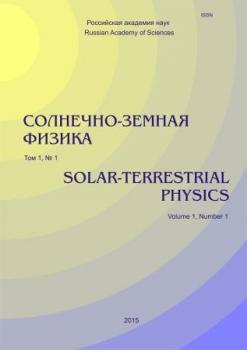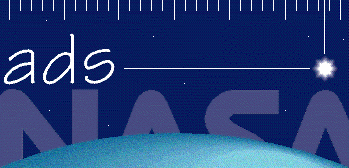Irkutsk, Russian Federation
Moscow, Russian Federation
Borok, Russian Federation
We examine the characteristics of oscillations of two types in the high-frequency edge of the ULF range (0.1–3 Hz), serpentine emission (SE), and discrete frequency dispersed signals (DS). Oscillations of both the types are observed in the polar caps exclusively with induction magnetometers. Since these instruments are currently practically absent at high latitudes, the analysis has been carried out from records obtained at the stations Vostok and Thule close to the geomagnetic poles in 1968–1971. The DS occurrence rate is shown to have a sharp peak at local magnetic noon. This fact indicates that DS emergence is rigidly tied to the geomagnetic field line passing through the observation station. At the same time, the seasonal variation in the frequency of DS occurrence has a main peak in local summer and an additional peak in local winter. We have revealed before that at least a part of DS is excited in the foreshock region. Taking this into account, we can assume that the wave packets incident to the magnetopause fall on the external field lines mainly in the noon region and propagate along these lines in both directions, eventually reaching Earth’s surface in the polar regions. Unlike DS, the SE occurrence rate has neither a daily nor a seasonal variation. We have tested and confirmed indirectly the hypothesis put forward earlier about the excitation of SE by cyclotron instability of protons in the solar wind, simulating frequency variations in ion-cyclotron waves at different levels of interplanetary plasma perturbation and comparing the results with the SE frequency variations observed under similar conditions. We conclude that it is necessary to resume continuous observations of ULF emissions, using induction magnetometers installed in polar caps near the projections of cusps and near geomagnetic poles.
ultra low frequency electromagnetic waves, polar caps, cusp, magnetosphere, solar wind
1. Asheim S. Serpentine emissions in the polar magnetic field. Oslo. 1983. 8 p. (Rep. ser. No. 83-38 / Inst. of Physics).
2. Berthomier M., Cornilleau-Wehrlin N., Fontaine D., Robert P., Canu P., Bouhram M., André M. CLUSTER-II observations of mid-altitude polar cleft turbulence. American Geophysical Union, Fall Meeting. 2004, Abstract id.SM51C-0394.
3. Dovbnya B.V., Potapov A.S. The frequency modulation of serpentine emission as compared to the set of the known periodicities of solar oscillations. Izvestiya, Physics of the Solid Earth. 2018, vol. 54, no. 5, pp. 680-687. DOI:https://doi.org/10.1134/S10 69351318050051.
4. Dovbnya B.V., Klain B.I., Guglielmi A.V., Potapov A.S. Spectrum of frequency modulation of serpentine emission as a reflection of the solar fluctuation spectrum. Solar-Terr. Phys. 2017, vol. 3, no. 1, pp. 73-77. DOI:https://doi.org/10.12737/article_58fd6 dfaa04833.19557687.
5. Farrell W.M., van Allen J.A. Observations of the Earth’s polar cleft at large radial distances with the Hawkeye-1 Magnetometer. J. Geophys. Res. 1990, vol. 95, no. A12, pp. 20945-20958.
6. Guglielmi A.V., Dovbnya B.V. Hydromagnetic emission of interplanetary plasma. Pisma v ZhETF [JETP Lett.]. 1973, vol. 18, no. 10, pp. 601-604. (In Russian).
7. Guglielmi A.V., Dovbnya B.V. Hydromagnetic emission of the interplanetary plasma. Astrophys. Space Sci. 1974, vol. 31, pp. 11-29.
8. Guglielmi A.V., Dovbnya B.V. Observarion of geomagnetic pulsations in the band 0-2 Hz with deep modulation of carrier frequency in polar cap. Geomagnetizm i aeronomiya [Geomagnetism and Aeronomy]. 1974, vol. 14, no. 5, pp. 868-870. (In Russian).
9. Guglielmi A.V., Potapov A.S. Propagation of guided waves in moving media with application to the theory of small-scale electromagnetic waves in the solar wind plasma. IEEE Xplore Digital Library / 2017 Progress In Electromagnetics Research Symposium - Spring (PIERS). 2017, pp. 1051-1054.
10. Guglielmi A., Potapov A., Dovbnya B. Five-minute solar oscillations and ion-cyclotron waves in the solar wind. Solar Phys. 2015, vol. 290, no. 10, pp. 3023-3032. DOI:https://doi.org/10.1007/s11207-015-0772-2.
11. Guglielmi A.V., Potapov A.S., Dovbnya B.V. Influence of the interplanetary magnetic field orientation on north-southern asymmetry of ULF wave packets in the polar caps. Geofizicheskie issledovaniya [Geophys. Res.] 2019, vol. 20, no. 2, pp. 19-27. DOI:https://doi.org/10.21455/gr2019.2-2. (In Russian).
12. Guglielmi A.V., Klain B.I., Potapov A.S. North-south asymmetry of ultra-low-frequency oscillations of Earth’s electromagnetic field. Solar-Terr. Phys. 2017, vol. 3, no. 4, pp. 26-31. DOI:https://doi.org/10.12737/stp-34201703.
13. Jian L.K., Russell C.T., Luhmann J.G., Strangeway R.J., Leisner J.S., Galvin A.B. Ion cyclotron waves in the solar wind observed by STEREO near 1 AU. Astrophys. J. 2009, vol. 701, iss. 2, pp. L105-L109. DOI:https://doi.org/10.1088/0004-637X/701/2/L105.
14. Jian L.K., Russell C.T., Luhmann J.G., Anderson B.J., Boardsen S.A., Strangeway R.J., Cowee M.M., Wennmacher A. Observations of ion cyclotron waves in the solar wind near 0.3 AU. J. Geophys. Res. 2010, vol. 115, p. A12115. DOI:https://doi.org/10.1029/2010JA015737.
15. Kurazhkovskaya N.A., Klain B.I. Isolated bursts of irregular geomagnetic pulsations in the region of the dayside cusp. Geomagnetism and Aeronomy. 2017, vol. 57, no. 5, pp. 566-578. DOI:https://doi.org/10.1134/S0016793217040119.
16. Lanzerotti L.J., Maclennan C.G., Konik R.M., Wolfe A., Venkatesan D. Cusp latitude magnetic impulse events. 1. Occurrence statistics. J. Geophys. Res. 1991, vol. 96, no. A8, pp. 14009-14022.
17. Manweiler J., Engebretson M., Connors M. February 2, 2017 observation of magnetic impulsive event (MIE) by AUTUMNX and van Allen Probes. 42nd COSPAR Scientific Assembly. Held 14-22 July 2018, in Pasadena, California, USA, Abstract id. C1.3-22-18.
18. Moiseev A.V., Baishev D.G., Barkova E.S., Du A., Yumoto K. Specific features of the generation of long-periodic geomagnetic pulsations in the event on June 25, 2008. Cosmic Res. 2015, vol. 53, no. 2, pp. 111-118. DOI:https://doi.org/10.1134/S0010 952515020057.
19. Morris R.J., Cole K.D. “Serpentine emission” at the high latitude Antarctic station Davis. Planet. Space Sci. 1987, vol. 35, pp. 313-328.
20. Sauvaud J.A., Barthe H., Aoustin C., Thocaven J.J., Rouzaud J., Penou E., et al. The ion experiment onboard the Interball-Aurora satellite; initial results on velocity-dispersed structures in the cleft and inside the auroral oval. Ann. Geophys. 1998, vol. 16, no. 9, pp. 1056-1069. DOI:https://doi.org/10.1007/s00585-998-1056-z.
21. Sibeck D.G., Korotova G.I. Occurrence patterns for transient magnetic field signatures at high latitudes. J. Geophys. Res. 1996, vol. 96, no. A6, pp. 13413-13428. DOI: 10.1029/ 96JA00187.
22. Yahnin A., Titova E., Lubchich A., Bosinger T., Manninen J., Turunen T., Hansen T., Troshichev O., Kotikov A. Dayside high latitude magnetic impulsive events: their characteristics and relationship to sudden impulses. J. Atmos. Terr. Phys. 1995, vol. 57, pp. 1569-1582.
23. Zhao G.Q., Feng H.Q., Wu D.J., Chu Y.H., Huang J. Time-dependent occurrence rate of electromagnetic cyclotron waves in the solar wind: Evidence for the effect of alpha particles? Astrophys. J. Lett. 2017, vol. 847, iss. 1, article id. L8, 4 p. DOI:https://doi.org/10.3847/2041-8213/aa88b3.
24. URL: https://omniweb.gsfc.nasa.gov/form/omni_min.html (accessed 8 May 2020).
25. URL: https://omniweb.gsfc.nasa.gov/ow.html (accessed 8 May 2020).
26. URL: https://cdaweb.gsfc.nasa.gov/istp_public (accessed 8 May 2020).




















